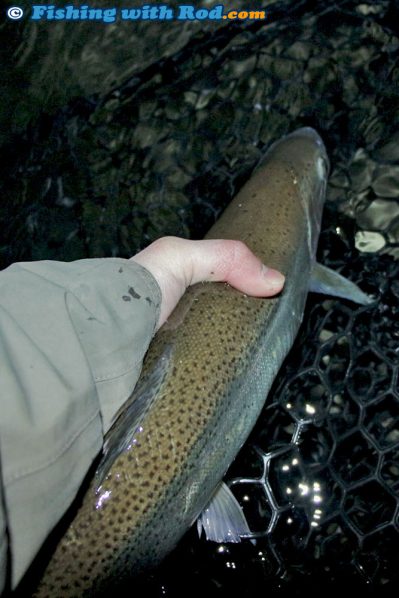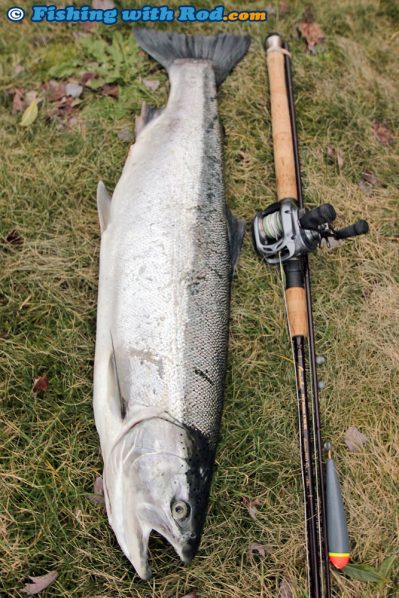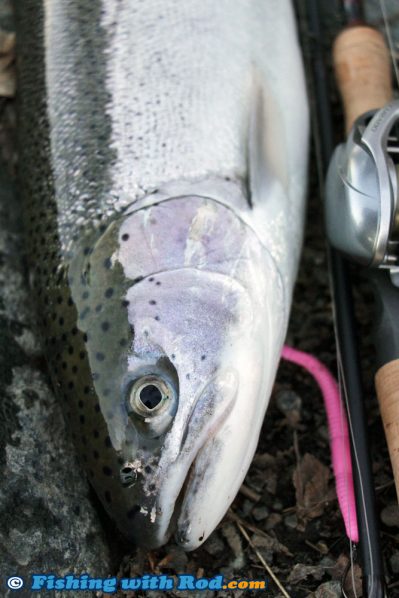Curing the Early Season Steelhead Bug
Published on Tuesday, January 31st, 2017
Between December and May, we always get excited about catching some winter steelhead from the Chilliwack/Vedder River. It’s a bizarre obsession which is hard to explain unless you really love to fish for steelhead. Why would you want to walk along the river all day in the cold just to see your float dipping once? That visual stimulus, the sight of that orange/green/yellow dot being buried, is the fuel of this obsession. The immediate first ten seconds after the burial can be explosive if your timing is correct, which may either be followed by a prized reward or a broken heart.
Reports of fish being caught usually start emerging in mid December. The Boxing Day Derby usually gives a good indication on how the season will be. This past Boxing Day Derby yielded pretty good results, 15 fish were weighed in and the average size was also quite big. Rod Toth from Bent Rods Fishing weighed in the winning fish, at 13.93lb.
As expected, mid January we saw a good push of fish throughout the river. The rain after the deep freeze, which raised the river level slightly, definitely improved the fishing. These January fish, are often found in packs, so it’s not uncommon to see multiple fish being hooked in the same run in a short period of time.
Last week, seeing how productive the fishing had been, I decided to make a few quick outings. With a tighter family and work schedule, these outings have to revolve around it, but I cannot complain. A couple of hours on the flow at a time is more than enough to kill the winter cabin fever. I normally do not enjoy fishing at first light, but it turned out to be the only time I could fish lately. I’ve found myself standing by the river bank at 7:00am, fighting off the Easterly breeze, so I could get in an hour of fishing before driving the kid to daycare.
Thursday was the first outing, and it didn’t take long for the float to disappear at dawn. I set the hook and found a tiny steelhead at the end of the line. This fish was no more than 2lb heavy. It was not a rainbow trout, but actually displayed characteristics which suggest anadromy. The entire body was bright silver, with distinct black spots all along the dorsal portion and tail. Most likely, it had decided to return to the river one or two years earlier than its siblings. Jacks and Jills are common among coho and chinook salmon, but this was the first steelhead returning prematurely I’ve encountered.
The following day, I returned to the same spot. The first hour was rather uneventful. The wind kept my hands frozen as I had left the gloves in the car. Finally at 8:15am, the float disappeared but I did not react quickly enough. The shrimp was ripped right off the hook. A few casts later, the shrimp was once again taken despite of the fact that I was a lot more alert this time. After ingesting two shrimp, presumably by the same fish, the bites stopped. Another 20 or 30 casts yielded no results, so out of desperation just before I had to leave, I threw on a pink worm. As the float made its way down the run on the first drift, it shot straight under at the same spot where the previous bites had occurred. I set the hook solidly this time, and there was contact. The immediate explosion on the surface made me realize that it was a good sized fish. After a good 2 minute battle, it approached the steep rocky shoreline I was on. Before I could take a second peek at it, that dreadful pop occurred. The hook, and the pink worm, flew into the air above my head as the fish swam away freely.
Since I couldn’t fish on the weekend, I instructed my friend Shane to check out the same spot where I was having success. The phone rang on Sunday morning and of course he was rewarded with a 13lb hatchery marked female steelhead after fishing through it with a piece of shrimp.
This morning, I was determined to finally not just hook, but to land one. Once again, at 7:00am I returned to the same spot. Water was getting quite clear, and the river had dropped some more, but this tailout was still looking fishy as the uneven rocks make great coverage for these fish to hide. After trying the shrimp for 30 minutes, not a single fish was interested so I gave the pink worm another shot. A few casts close to shore yielded nothing, so I decided to whip it just a little further out. As it drifted downstream in the slightly shallower, but more turbulent water, the float was buried once again. There were a few hard kicks on the rod, but that dreadful feeling happened again. The fish popped off once again.
Frustrated but more motivated, I threw the pink worm back to the same spot. It’s not unusual to see another steelhead present in the same slot, at least that was my hope. A dozen or so more drifts came up empty, so I moved a few steps further downstream. This appeared to be the right move, because the float was once again buried on the following drift. The connection felt a lot tighter this time, so I carefully guided the fish in without putting on too much pressure. It was not a very big specimen. My first glance estimated it to be around 6lb. As it got closer to shore, panic mode set in because the steep bank was once again a challenge. After several attempt, I finally managed to guide it into a shallower spot where I could reach its tail. The absence of the adipose fin meant it was a hatchery marked fish which I could keep, so I decided to retain this beautiful hen. Although not as big as the one which got away on Friday (after all, the ones that get away are always bigger right?), I was very thrilled. Just like any other fish caught in the lower river in January, this fish was as fresh as they get. It was a good start of my day!
Winter steelhead fishing in the Chilliwack/Vedder River system can be done until May. Surges of fish can be seen throughout January and February, but the fishing in March and April can also be excellent as more fish are found in the system while warmer weather means more active fish. If you would like to try out this fishery for the first time, be sure to purchase the steelhead conservation surcharge on your freshwater fishing licence. The daily quote of hatchery marked steelhead is one and you must stop fishing once you keep your fish. All wild fish are required to be released with care so we can ensure our steelhead populations are sustainable. Good luck!



